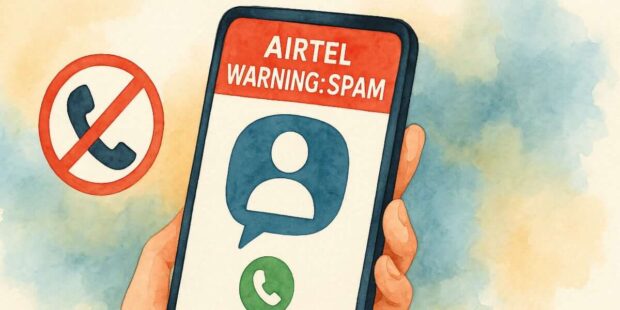Late last year, Airtel started rolling out a new anti-spam feature across its network — a backend AI system that flags potentially suspicious phone calls and text messages, displaying a simple “Airtel Warning: SPAM” tag on your screen when such activity is detected for incoming calls and SMS messages.
It’s one of those rare telecom upgrades that quietly improves day-to-day usability without requiring any action from the user. And it seems to have had some real impact. In an email sent to customers this week, Gopal Vittal (VC and MD, Airtel) shared that since the feature launched in September 2024, Airtel’s systems have flagged over 27.5 billion calls and more than 500 million SMS messages as suspicious.
The spam warning feature is now getting two notable enhancements:
1. International Spam Call Detection
According to Airtel, scammers quickly adapted to the initial rollout by switching to international numbers to continue spamming users. As a result, the telco says there’s been a 12% increase in spam calls originating from overseas in the last six months.
To counter that, Airtel has now extended its spam detection capability to international numbers as well. Starting April 21, 2025, users will see the same “Airtel Warning: SPAM” label even when the suspicious call is coming from outside India.
“Spammers started adopting even more innovative methods… using international numbers to make spam calls,” said Gopal Vittal. “We have enhanced our AI tool to now identify and mark suspicious numbers as spam, even from international locations.”
2. Spam Alerts in Regional Languages
Airtel also announced that spam warning messages will now appear in a range of Indian regional languages, based on user preference or system language. Supported languages include Hindi, Marathi, Bengali, Gujarati, Tamil, Telugu, Kannada, Malayalam, Urdu, and Punjabi, along with English.
This is a smart move — not everyone processes alerts in English effectively, especially when quick decision-making is needed to avoid a scam call.
“Many of you have told us to alert you in the language that you are comfortable in,” said Vittal. “This is why our spam warnings will now be communicated in [these languages] besides English.”
⸻
Airtel says it’s continuing to evolve this system based on usage patterns and feedback. If nothing else, it’s a sign that mobile networks are finally beginning to take the spam problem seriously — and putting actual tech muscle behind solving it.
Hopefully the improvements keep coming, at least enough that we no longer need to rely on Truecaller. I wonder if we’ll see something similar from Jio too in the coming months.
